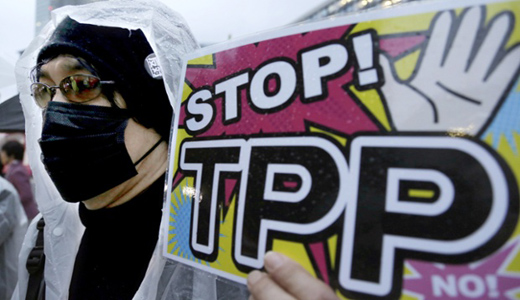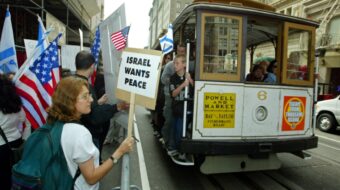
Unless you’ve spent the winter lost on the Pacific Crest Trail, you know that middle-class incomes have slipped again. In fact, everyone’s wage is down except for the top ten percent. Median incomes for the bottom 20 percent fell four percent; for the middle by six percent, and hourly wages have barely kept pace with inflation.
Why? Conventional wisdom says hordes of unemployed workers could return to the market place at any moment. That makes current employees afraid to change jobs to find higher incomes, or they are fearful about also joining the ranks of the long-term jobless. But there is a better reason for stagnant wages that mainstream commentators seldom mention – free trade agreements.
The Reagan Administration’s infamous attack on unions, and its deregulation of industries from trucking to airlines, put middle-class jobs at risk everywhere, because those industries’ pay scales were backed by the power of organized labor. Then so-called New Democrats under the Clinton Administration joined with Republicans to adopt NAFTA – the North American Free Trade Agreement – and more good manufacturing jobs (again, many of them union) fled across the border. American companies seized the opportunity to set up maquiladoras – manufacturing zones just south of the Mexican border – and shut unionized factories here. Suddenly everything from car parts to jeans came from low-wage locations, which created work in Mexico, but also massive dislocation, even as it closed jobs here.
The high-tech boom created a mythology that dominated the business pages for a decade. The American middle class would now become the “creative” class. Americans no longer needed to make things – we’d invent and design them, and somebody else would make them. So from iPhones to underwear, Americans designed and the people of Mexico, or China, or some other low-wage place, made them. It fit the postmodern economic analysis that American jobs in the future would no longer be found on menial assembly lines.
Apparently nobody noticed that this system neither grew the economy nor ended lousy jobs – it just paid less for tedious tasks. I can remember when a good working-class job in Los Angeles earned $30 or $40 or even $50 an hour. Now it pays $15-20. In the last five years 65 percent of jobs created in this country pay $20 an hour or less. People are either making a lot of money or no money.
Now comes another “free trade” deal. Known as TPP – the Trans-Pacific Partnership – it links some Western Hemisphere nations to Asia. Some of us think it is NAFTA on steroids.
Proponents – including the president – claim TPP will create 600,000 jobs and stir the economy from its torpor. But even such free trade agreement fans as the Washington Post fact-checked the claim and concluded that it would likely create no jobs. Zero. Nada. Michael Hiltzik, business columnist for the Los Angeles Times, thinks it likely grows neither the economy of the U.S. nor of the other nations involved.
Beyond that, TPP carries some insidious side-effects that could do a lot more damage. One element allows multinational corporations to sue national, state and even local governments in international courts of arbitration for environmental or financial regulations that curtail their current practices. Raising the minimum wage, mandating a skull and crossbones on a pack of cigarettes, or limiting air pollutants could end up not in local courtrooms but in some obscure office far, far away.
All of this is being negotiated in secret. The media only know some of these details because of leaks. Actually the élite of wealth and power probably know a lot more because they discuss these kinds of things over drinks at Davos and other power hangouts. Furthermore, the president wants this agreement “fast-tracked,” which means voted on by both houses of Congress within 90 days, no amendments and no filibuster.
Asleep yet? That’s exactly what the people who negotiate these kinds of deals want so you won’t notice that another nail has been put into the coffin of organized labor and the American middle class. It’s another reason why the hotel workers, retail clerks and truck drivers are fighting for better wages for jobs that can’t be shipped overseas. It’s why all of us fight to protect the earth on which and through which “we live and have our being,” as St. Paul put it.
Reprinted by kind permission of the author and Capital and Main.
Rev. Jim Conn is the founding minister of the Church in Ocean Park and served on the Santa Monica City Council and as that city’s mayor. He helped found Clergy and Laity United for Economic Justice, Los Angeles, and was its second chair, and was a founder of Santa Monica’s renter’s rights campaign.
Photo: Shizuo Kambayashi/AP

MOST POPULAR TODAY


Zionist organizations leading campaign to stop ceasefire resolutions in D.C. area

Communist Karol Cariola elected president of Chile’s legislature

Afghanistan’s socialist years: The promising future killed off by U.S. imperialism

High Court essentially bans demonstrations, freedom of assembly in Deep South






Comments